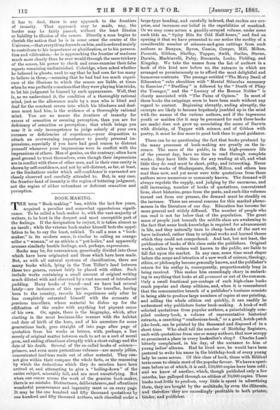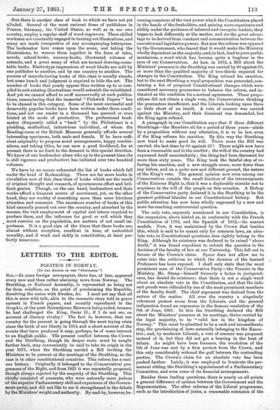BOOK-MAKING.
THE term " Book-making " has, within the last few years, acquired a peculiar and somewhat opprobrious signifi- cance. To be called a book-maker is, with the vast-majority of writers, to be hurt in the deepest and most susceptible part of the feelings. If the designation be unjust, it is taken almost as an insult ; while the veteran book-maker himself feels the appel- lation to be, to say the least, unkind. To call a man a "book- maker," in its modern sense, is similar to calling an orange- seller a "woman," or an athlete a "pot-boiler," and apparently arouses similarly hostile feelings, and, perhaps, expressions.
Books may be, for convenience, generically divided into those which have been originated and those which have been made. But, as with all natural systems of classification, there are many books which, lying in the Tom Tidler's land between -these two genera, cannot fairly be placed with either. Such include works containing a small amount of original writing much diluted with and obscured by a vast amount of introduced • padding. Many books of travel—and we have had several lately—are instances of this species. The traveller, having been to the country, records his experiences only after he has completely saturated himself with the accounts of previous travellers, whose material he dishes up for the edification of the reader with anything but piquant sauce of his own. Or, again, there is the biography, which, after starting in the most business-like manner with the habitat and date of birth of the hero, and of his ancestors for some generations back, goes straight off into page after page of quotation from his works or letters, with, perhaps, a line merely of original matter between each to act as a sort of moral gum, and ending oftentimes abruptly with a short eulogy and the date of his death. Several of the so-called books of science— primers, and even more pretentious volumes—are merely jellies, concentrated beef-teas made out of other material. They can- not give within their compass the whole facts, or the reasoning by which the deductions which they do mention have been arrived at, and attempting to give a "boiling-down" of the entire subject, miserably fail, and are most unsatisfying. But when one comes across the work of' the genuine book-maker, there is no mistake. Distinctness, deliberateness, and oftentimes wonderful perseverance and ingenuity meet us on every page. It may be the one hundred and fifty thousand quotations by one hundred and fifty thousand authors, each classified under a large-type heading, and carefully indexed, that excites our sur- prise, and increases our belief in the capabilities of mankind. Or we may come across a gaudily-arrayed volume, under some such title as, " Spicy Bits for Odd Half-hours," and find on opening it that we have presented to our notice the medley of a considerable number of scissors-and-gum cuttings from such authors as Bunyan, Byron, Combo, Cowper, Mill, Milton, Prescott, Gibbon, Shelley, Tupper, Swift, Smiles, Sterne, Darwin, Machiavelli, Paley, Boccaccio, Locke, Fielding, and Kingsley. We take the names from the list of authors in a book of this kind now before us, the extracts in which are arranged so promiscuously as to afford the most delightful and humorous contrasts. The passage entitled "The Merry Devil of Edmonton" rubs shoulders with "Mental Stimulus necessary to Exercise ;" " Duelling " is followed by the 'Death of Pliny the Younger," and the "Luxury of the Roman Nobles" is closely associated with "The Pains of Opium." In most of these books the snippings seem to have been made without any regard to context. Beginning abruptly, ending abruptly, the excerpts are likely to become hopelessly jumbled up in the mind with the names of the various authors, and if the ingenuous youth or maiden (for it may be presumed for such these books are made) does not grow up associating the name of Darwin with divinity, of Tupper with science, and of Gibbon with poetry, it must be due more to good lack than to good guidance.
There can be no questioning the fact that books produced by the many processes of book-making are greatly on the in- crease. The mass of the public, in the high-pressure life of the present day, have no time to read through complete works ; they have little time for any reading at all, and what little they do read must be short, pithy, and interesting. Never were the works of Shakespeare, Scott, Milton, and others less read than now, and yet never were trite quotations from these authors more numerous or commonly known. The demand will always regulate the supply, and judging by the enormous, and still increasing, number of books of quotations, concentrated lives, short histories, gems from the poets, and such-like volumes turned out from our presses, the demand must be steadily on the increase. There are several reasons for this marked pheno- menon in the literature of our day. Education has become far more general and widely diffused. The number of people who can read is not far below that of the population. The great mass of people just beneath the middle-class are awakening to the fact that some book-knowledge is required for advancement in life, and they naturally turn to cheap books of the sort we have indicated, rather than to original works and learned theses which they could not comprehend. And last, but not least, the publication of books of this class suits the publishers. Original works, unless by writers well known to the public, are liable to fall flat upon the market. In any case, some time must elapse before the scope and intention of a new work of science, theology, ethics, or philosophy become generally known, and the publisher's return. for his outlay is, consequently, proportionately long in being received. This makes him exceedingly chary in embark- ing in anything that looks at all pronance or out of the common. Only a small fractional per-centage of such high-class books reach popular and cheap editions, and, when it is remembered that the remunerative branch of a publisher's business consists in being able to produce large numbers of copies at one printing, and selling the whole edition out quickly, it can readily be understood why publishers foster book-making. A book of well selected quotations from popular authors, a painstakingly com- piled cookery-book, a volume of representative historical extracts, a searching" confessions-book," or a good, hotch-petch joke-book, can be printed by the thousand and disposed of in a short time. Who shall tell the number of Birthday Registers, each with quotations from one or many authors, that now occupy so prominent a place in every bookseller's shop ? Charles Lamb bitterly complained, in his day, of the nuisance to him of young ladies' albums. Had he lived now, he would have been pestered to write his name in the birthday-book of every young lady he came across. Of this class of book, those with Biblical texts seem to obtain most of the popular favour. We have a speci- men before us of which, it is said, 150,000 copies have been sold ; and we know of another, which, though published only a few months, has galloped through an edition of 70,000 copies. These books cost little to produce, very little is spent in advertising them, they are bought by the multitude, by even the illiterate, and therefore they are exceedingly profitable to both printer, binder, and publisher. But there is another class of book to which we have not yet -alluded. Several of the most eminent firms of publishers in France, Germany, the United States, as well as in our own country, employ a regular staff of wood engravers. These skilled workmen are constantly engaged in turning out illustrations, and many are made irrespective of any accompanying letterpress. The bookmaker here comes upon the scene, and taking the illustrations, he weaves them together in the form of tales, novels, school-books, nursery-books, illustrated volumes of extracts, and a great many of 'what are termed drawing-room- table books. Electrotype impressions of wood blocks are sold by one publisher to another, and by one country to another. The process of manufacturing books of this class is usually simple, but some knack and judgment is required to hide the art. The number of books that yearly appear thus written up to or com- piled to suit existing illustrations would astonish the uninitiated. And yet we cannot afford to scoff unreservedly at such publica- tions, remembering that the immortal "Pickwick Papers" has to be classed in this category. Some of the most successful and -deservedly popular books have been written under these condi- tions, and not one reader in a thousand has guessed or even hinted at the mode of production. The professional book- maker (frequently called a "hack" by the Philistines) is a plodding, methodical, industrious individual, of whom the
Reading-room at the British Museum generally affords several interesting specimens, both male and female. If he have suffi- cient originality to propose novel arrangements, happy combin- ations, and taking titles, he can earn a good livelihood, for at present there is no limit to the demand in this special direction. We know of one bookmaker alone who up to the present time (he is still vigorous and productive) has initiated over two hundred volumes.
We have by no means exhausted the list of books which fall under the head of Bookmaking. There are far more books in circulation now of this class than of books which are the result of original thcught and research, of spontaneous effort and bril- liant genius. Though, on the one hand, bookmakers and their works afford a frequent source of merriment, yet, on the other band, they are worthy of something more than mere frivolous attention and comment. The enormous number of books of this kind annually poured out over the country, and absorbed by the masses, the vast employment of capital and labour required to produce them, and the influence for good or evil which they must exercise on the population, are matters of not small im- portance. It is a good sign of the times that these books are, almost without exception, excellent in tone, of undoubted morality, and if weak and sickly in constitution, at least per- fectly innocuous.







































 Previous page
Previous page